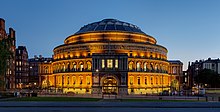
| Country: | : | United Kingdom |
| City | : | London |
| Date | : | Saturday 6 April 1968 |
| Location | : |  Royal Albert Hall, London, United Kingdom Royal Albert Hall, London, United Kingdom |
| Broadcaster | : | BBC  |
| Host | : | Catherine (Katie) Boyle |
| Executive Producer | : | Tom Sloan |
| EBU Scrutineer | : | Clifford Brown |
| Director | : | Stewart Morris |
| Winner | : |  Massiel from Spain Massiel from Spain |
The Eurovision Song Contest 1968 was the 13th edition of the annual Eurovision Song Contest. It took place in London, United Kingdom, following the country’s first victory at the 1967 contest with the song „Puppet on a String“ by Sandie Shaw. Despite having won for the first time the year before, it was actually the third time that the United Kingdom had hosted the competition, having previously done so in 1960 and 1963, both of which also took place in London. Organised by the European Broadcasting Union (EBU) and host broadcaster British Broadcasting Corporation (BBC), the contest was held at Royal Albert Hall on Saturday 6 April 1968, and was hosted by Katie Boyle for the third time. It was notably also the first time that the contest was broadcast in colour.
Seventeen countries participated in the contest, the same countries that had participated the previous year.
The winner was Spain with the song „La, la, la“ by Massiel, and written/composed by Manuel de la Calva and Ramón Arcusa. This was Spain’s first victory – and their first ever top five placing – in the contest. With her winning reprise, she became the first winner to perform part of her song in English, in addition to the original version.
Location

The contest was held at the Royal Albert Hall in London. The Royal Albert Hall is known for hosting the world’s leading artists from several performance genres, sports, award ceremonies, the annual summer Proms concerts and other events since its opening in 1871, and has become one of the United Kingdom’s most treasured and distinctive buildings.
Format
1968 was the first time that the Eurovision Song Contest was broadcast in colour. The countries that broadcast it in colour were France, Germany, the Netherlands, Norway, Switzerland, Sweden and the United Kingdom, although in the UK it was broadcast as an encore presentation in colour on BBC Two the next day. All of Eastern Europe as well as Tunisia broadcast the contest as well.
Prior to the contest, the bookmakers were sure of another british victory, as the English singer Cliff Richard, who was already dominating the music charts at that time, was hotly tipped as the favourite to win, but in the end he lost out to Spain’s song by a margin of just one point.
Originally Massiel’s song La La La was supposed to be sung by Spanish singer Joan Manuel Serrat who wanted to perform the song in Catalan. At the request of Spanish officials, however, Juan Manuel was replaced by Massiel who sang the same song in Castilian (Spanish).
Participating countries
All countries that had participated in 1967 also participated in 1968.
Conductors
Each performance had a maestro who conducted the orchestra.
 Portugal – Joaquim Luís Gomes
Portugal – Joaquim Luís Gomes  Netherlands – Dolf van der Linden
Netherlands – Dolf van der Linden Belgium – Henri Segers
Belgium – Henri Segers Austria – Robert Opratko
Austria – Robert Opratko Luxembourg – André Borly
Luxembourg – André Borly Switzerland – Mario Robbiani
Switzerland – Mario Robbiani Monaco – Michel Colombier
Monaco – Michel Colombier Sweden – Mats Olsson
Sweden – Mats Olsson Finland – Ossi Runne
Finland – Ossi Runne France – Alain Goraguer
France – Alain Goraguer Italy – Giancarlo Chiaramello
Italy – Giancarlo Chiaramello United Kingdom – Norrie Paramor
United Kingdom – Norrie Paramor Norway – Øivind Bergh
Norway – Øivind Bergh Ireland – Noel Kelehan
Ireland – Noel Kelehan Spain – Rafael Ibarbia
Spain – Rafael Ibarbia  Germany – Horst Jankowski
Germany – Horst Jankowski Yugoslavia – Miljenko Prohaska
Yugoslavia – Miljenko Prohaska
Returning artists
Bold indicates a previous winner.
| Artist | Country | Previous year(s) |
|---|---|---|
| Isabelle Aubret | 1962 |
| # | Representing country | Performer(s) | Song title, writer(s) and composer(s) | Points | Place |
|---|---|---|---|---|---|
| 01 | Portugal RTP RTP | Carlos Mendes | Verão | 005 | 11 |
| 02 | The Netherlands NTS NTS | Ronnie Tober | Morgen | 001 | 16 |
| 03 | Belgium RTB RTB | Claude Lombard | Quand Tu Reviendras | 008 | 07 |
| 04 | Austria ORF ORF | Karel Gott | Tausend Fenster | 002 | 13 |
| 05 | Luxembourg CLT CLT | Chris Baldo and Sophie Garel | Nous Vivrons D’amour | 005 | 11 |
| 06 | Switzerland SSR SRG SSR SRG | Gianni Mascolo | Guardando Il Sole | 002 | 13 |
| 07 | Monaco TMC TMC | Line and Willy | A Chacun Sa Chanson | 008 | 07 |
| 08 | Sweden SR SR | Claes-Göran Hederström | Det Börjar Verka Kärlek, Banne Mej | 015 | 05 |
| 09 | Finland YLE YLE | Kristina Hautala | Kun Kello Käy | 001 | 16 |
| 10 | France ORTF ORTF | Isabelle Aubret | La Source | 020 | 03 |
| 11 | Italy RAI RAI | Sergio Endrigo | Marianne | 007 | 10 |
| 12 | United Kingdom BBC BBC | Cliff Richard | Congratulations | 028 | 02 |
| 13 | Norway NRK NRK | Odd Børre | Stress | 002 | 13 |
| 14 | Ireland RTÉ RTÉ | Pat McGeegan | Chance Of A Lifetime | 018 | 04 |
| 15 | Spain TVE TVE | Massiel | La, La, La… | 029 | 01 |
| 16 | Germany ARD ARD | Wencke Myhre | Ein Hoch Der Liebe | 011 | 06 |
| 17 | Yugoslavia JRT JRT | Luci Kapurso and Hamo Hajdarhodzic | Jedan Dan | 008 | 07 |

Scoreboard
Due to a misunderstanding by the hostess, Katie Boyle, Switzerland were erroneously awarded 3 points by Yugoslavia, instead of 2. The scrutineer asked for the Yugoslav votes from TV Skopje to be announced a second time.
| Participant |  |  |  |  |  |  |  |  |  |  |  |  |  |  |  |  |  | Points | Place |
|---|---|---|---|---|---|---|---|---|---|---|---|---|---|---|---|---|---|---|---|
 Portugal Portugal | 2 | 3 | 5 | 11 | |||||||||||||||
 The Netherlands The Netherlands | 1 | 1 | 16 | ||||||||||||||||
 Belgium Belgium | 1 | 1 | 3 | 1 | 1 | 1 | 8 | 7 | |||||||||||
 Austria Austria | 2 | 2 | 13 | ||||||||||||||||
 Luxembourg Luxembourg | 1 | 1 | 1 | 1 | 1 | 5 | 11 | ||||||||||||
 Switzerland Switzerland | 2 | 2 | 13 | ||||||||||||||||
 Monaco Monaco | 3 | 1 | 1 | 2 | 1 | 8 | 7 | ||||||||||||
 Sweden Sweden | 1 | 4 | 6 | 1 | 1 | 2 | 15 | 5 | |||||||||||
 Finland Finland | 1 | 1 | 16 | ||||||||||||||||
 France France | 2 | 6 | 2 | 3 | 1 | 3 | 3 | 20 | 3 | ||||||||||
 Italy Italy | 1 | 2 | 2 | 2 | 7 | 10 | |||||||||||||
 United Kingdom United Kingdom | 2 | 2 | 4 | 2 | 1 | 1 | 1 | 5 | 1 | 3 | 4 | 2 | 28 | 2 | |||||
 Norway Norway | 1 | 1 | 2 | 13 | |||||||||||||||
 Ireland Ireland | 4 | 1 | 1 | 1 | 4 | 1 | 6 | 18 | 4 | ||||||||||
 Spain Spain | 2 | 3 | 4 | 6 | 1 | 3 | 1 | 4 | 1 | 4 | 29 | 1 | |||||||
 Germany Germany | 1 | 2 | 2 | 1 | 5 | 11 | 6 | ||||||||||||
 Yugoslavia Yugoslavia | 1 | 1 | 3 | 1 | 1 | 1 | 8 | 7 |
Facts & figures
- The 1968 Eurovision Song Contest was not only broadcast in the participating countries, but also all of Eastern Europe and Tunisia could follow it;
- For Katie Boyle, it was already her third Eurovision Song Contest as a presenter, but not her last: Mrs. Boyle would return for yet another contest just as the unlucky Cliff Richard!
Incidents
Spanish artist replacement
Originally Spain entered Joan Manuel Serrat to sing „La, la, la“, but his demand to sing in Catalan was an affront to the Francoist State dictatorship. Therefore Massiel, who was on tour in Mexico, was brought in as a late replacement. In just two weeks, she had to rush back to Spain, learn the song, record it in several languages, travel to Paris to get a dress and go to London for rehearsals. She sang the song in the contest in Spanish with the new arrangement made to fit her. In her winning reprise, she performed part of her song in English, in addition to the original version, becoming the first winner to do so.
Vote rigging allegations
In May 2008, a documentary by Spanish film-maker Montse Fernández Villa, 1968. Yo viví el mayo español, centred on the effects of May 1968 in Francoist Spain, and alleged that the 1968 Eurovision Song Contest was rigged by the Spanish caudillo Francisco Franco, who would have sent state television officials across Europe offering cash and promising to buy television series and contract unknown artists. The allegation was based on a testimony by journalist José María Íñigo, a TVE employee at the time, who claimed the rigging was common knowledge and suggested that Spanish record label representatives offered to release albums by Bulgarian and Czech artists (neither Bulgaria nor Czechoslovakia were members of the European Broadcasting Union at the time, though in the 1968 contest, Austria was represented by Karel Gott, who was from Czechoslovakia.).
The documentary claimed that the contest should in fact have been won by the United Kingdom’s entry – „Congratulations“ performed by Cliff Richard – which finished second by one vote. Massiel, the performer of the winning entry, was outraged by the allegations, and claimed that if there had been fixes, „other singers, who were more keen on Francoist Spain, would have benefited“. José María Iñigo, author of the statement in the documentary, personally apologized to Massiel and said that he had repeated a widespread rumour. Both Massiel and Iñigo accused television channel La Sexta, broadcaster of the documentary, of manufacturing the scandal.